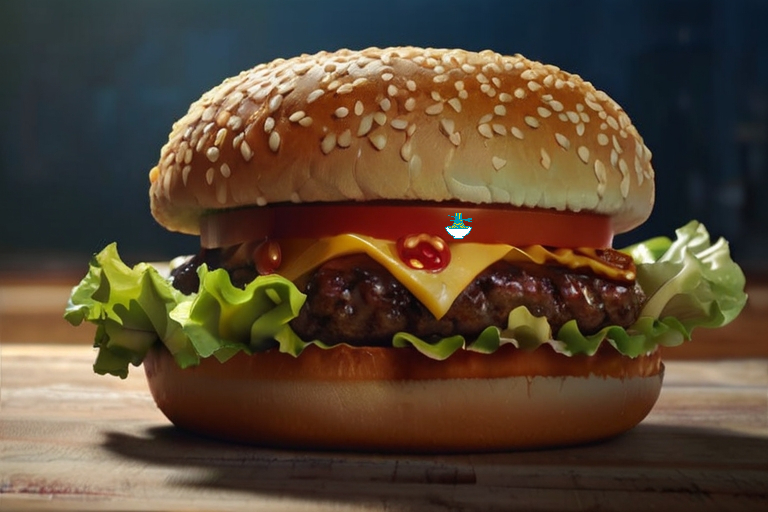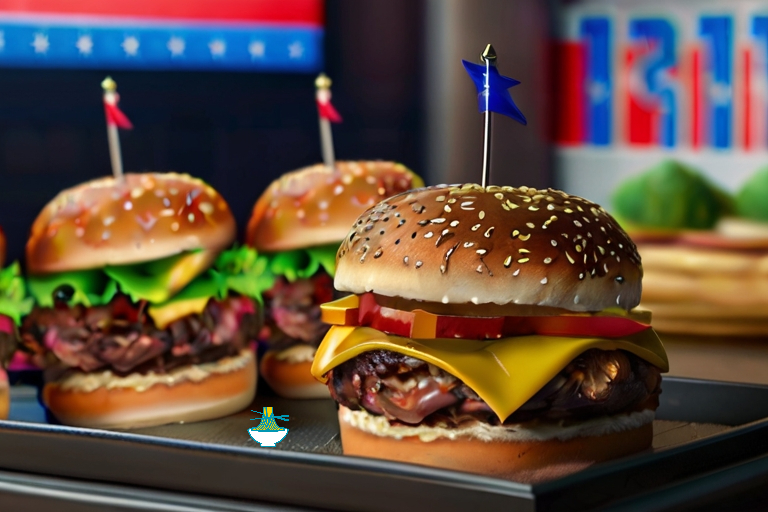Indulge in the flavors of democracy with our Liberty Burger, where every bite is a celebration of choice and freedom. Crafted with the finest ingredients and seasoned with a dash of equality, this burger embodies the spirit of democracy. Enjoy a juicy patty made from sustainably sourced beef or a delectable plant-based alternative, served on a bun baked to perfection. With a colorful array of toppings to represent diversity and inclusion, each bite is a testament to the power of democracy. Whether you prefer classic American cheese or adventurous avocado, our Liberty Burger ensures that every voice is heard and every preference respected. Join us in savoring the taste of democracy with every delicious bite.
Ingredients:
For the Burger Patties:
- 1 pound ground beef or plant-based alternative (such as Beyond Meat or Impossible Burger)
- 1/4 cup finely chopped onion
- 2 cloves garlic, minced
- 1/4 cup bread crumbs
- 1 egg (omit if making vegan)
- Salt and pepper to taste
For the Toppings:
- Whole grain burger buns
- Lettuce leaves
- Sliced tomatoes
- Sliced onions
- Avocado slices
- Pickles
- Cheese slices (dairy or vegan)
- Ketchup, mustard, and mayonnaise (optional)
- Sprouts (optional)

Instructions:
Prepare the Burger Patties:
1- In a mixing bowl, combine the ground beef or plant-based alternative with chopped onion, minced garlic, bread crumbs, egg (if using), salt, and pepper.
2- Mix until well combined, but avoid overmixing to keep the patties tender.
3- Divide the mixture into equal portions and shape them into burger patties. Make them about 1/2 to 3/4 inch thick for even cooking.
Cook the Patties:
1- Heat a grill or a skillet over medium-high heat.
2- Place the burger patties on the grill or skillet and cook for about 4-5 minutes on each side, or until they reach your desired level of doneness.
3- If using cheese, place a slice on top of each patty during the last minute of cooking to allow it to melt.
Assemble the Burgers:
1- Slice the burger buns in half and lightly toast them on the grill or in a toaster.
2- Spread your preferred condiments (ketchup, mustard, mayonnaise) on the bottom half of each bun.
3- Place a lettuce leaf on top of the condiments, followed by a cooked burger patty.
4- Add sliced tomatoes, onions, avocado slices, pickles, and any other desired toppings.
5- Top with the other half of the burger bun.
Serve and Enjoy:
1- Serve the Democratic Hamburgers with a side of fries, salad, or your favorite side dish.
2- Encourage everyone to customize their burgers according to their tastes, promoting inclusivity and choice.
3- Enjoy these delicious burgers with friends and family, celebrating the flavors of democracy and diversity.
This recipe allows for customization to accommodate various dietary preferences, making it a democratic choice for any gathering or meal.
Nutritional Values:
Here's a general overview of the approximate nutritional values for the main ingredients used in the Democratic Hamburger recipe. Keep in mind that these values can vary based on specific brands and variations of ingredients used:
Ground Beef (80% lean):
- Serving Size: 4 ounces (113 grams)
- Calories: 287 kcal
- Protein: 22.5 grams
- Total Fat: 21 grams
- Saturated Fat: 8.5 grams
- Trans Fat: 1 gram
- Cholesterol: 89 mg
- Sodium: 73 mg
- Total Carbohydrates: 0 grams
- Dietary Fiber: 0 grams
- Sugars: 0 grams
benefits:
- Protein source: Provides essential amino acids necessary for muscle repair and growth.
- Iron: Supports the production of red blood cells and helps prevent anemia.
- Vitamin B12: Supports nerve function and helps produce DNA.
- Zinc: Important for immune function, wound healing, and DNA synthesis.
Beyond Meat Plant-Based Patty (Original):
- Serving Size: 1 patty (113 grams)
- Calories: 270 kcal
- Protein: 20 grams
- Total Fat: 20 grams
- Saturated Fat: 6 grams
- Trans Fat: 0 grams
- Cholesterol: 0 mg
- Sodium: 380 mg
- Total Carbohydrates: 5 grams
- Dietary Fiber: 2 grams
- Sugars: 0 grams
benefits:
- Plant-based protein: Offers a source of protein for muscle repair and overall health.
- Low in saturated fat: Helps maintain heart health and cholesterol levels.
- No cholesterol: Supports heart health and reduces the risk of cardiovascular disease.
- No animal products: Suitable for vegetarians, vegans, and those looking to reduce meat consumption.
Whole Grain Burger Bun (average):
- Serving Size: 1 bun (about 2.5 ounces or 70 grams)
- Calories: 180 kcal
- Protein: 6 grams
- Total Fat: 2.5 grams
- Saturated Fat: 0.5 grams
- Trans Fat: 0 grams
- Cholesterol: 0 mg
- Sodium: 340 mg
- Total Carbohydrates: 34 grams
- Dietary Fiber: 5 grams
- Sugars: 4 grams
benefits:
- Dietary fiber: Supports digestive health, helps regulate blood sugar levels, and promotes satiety.
- Complex carbohydrates: Provides sustained energy and helps maintain stable blood sugar levels.
- B vitamins: Important for metabolism, energy production, and overall cellular function.
- Antioxidants: Found in the outer layers of whole grains, they help protect cells from damage.
Avocado (medium-sized):
- Serving Size: 1/2 avocado (about 100 grams)
- Calories: 160 kcal
- Protein: 2 grams
- Total Fat: 15 grams
- Saturated Fat: 2 grams
- Trans Fat: 0 grams
- Cholesterol: 0 mg
- Sodium: 7 mg
- Total Carbohydrates: 9 grams
- Dietary Fiber: 7 grams
- Sugars: 0.7 grams
benefits:
- Healthy fats: Monounsaturated fats help lower bad cholesterol levels and reduce the risk of heart disease.
- Fiber: Supports digestive health, promotes satiety, and helps regulate blood sugar levels.
- Potassium: Important for regulating blood pressure and maintaining proper muscle and nerve function.
- Vitamins and antioxidants: Rich in vitamins E, K, C, and various antioxidants, which support overall health and immune function.
These values provide a rough estimate of the nutritional content of the main ingredients used in the Democratic Hamburger recipe. Make sure to consider the specific ingredients and portion sizes used in your recipe for more accurate calculations. Additionally, the values provided for the plant-based patty are based on a popular brand; variations may occur with different brands or homemade versions.


Comments